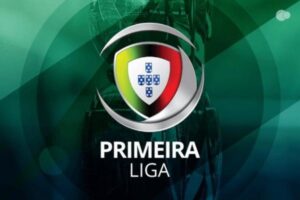Know Everything About Manchester City F.C.
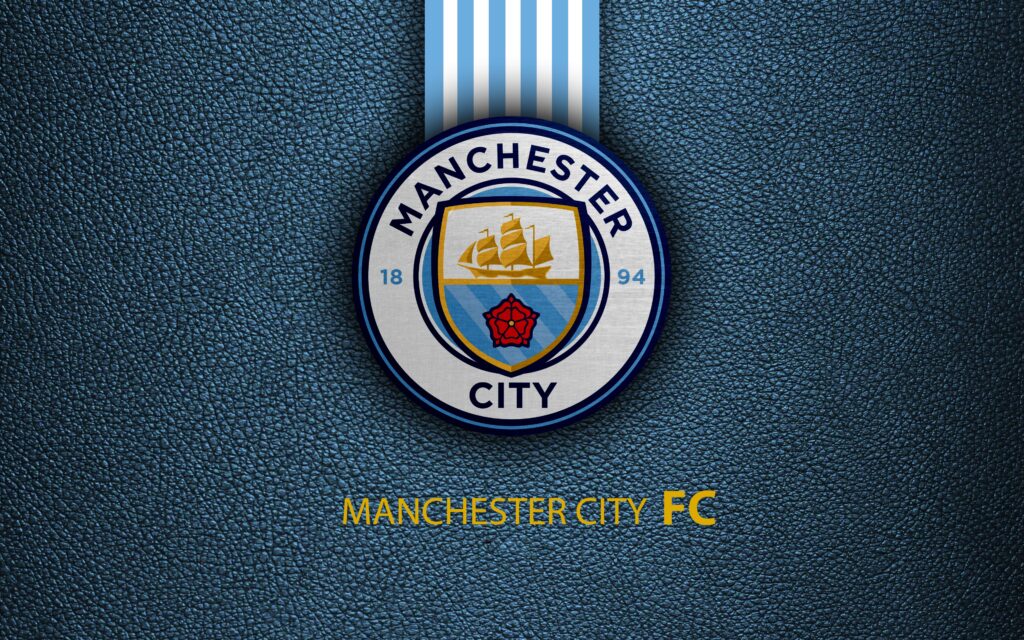
Share this
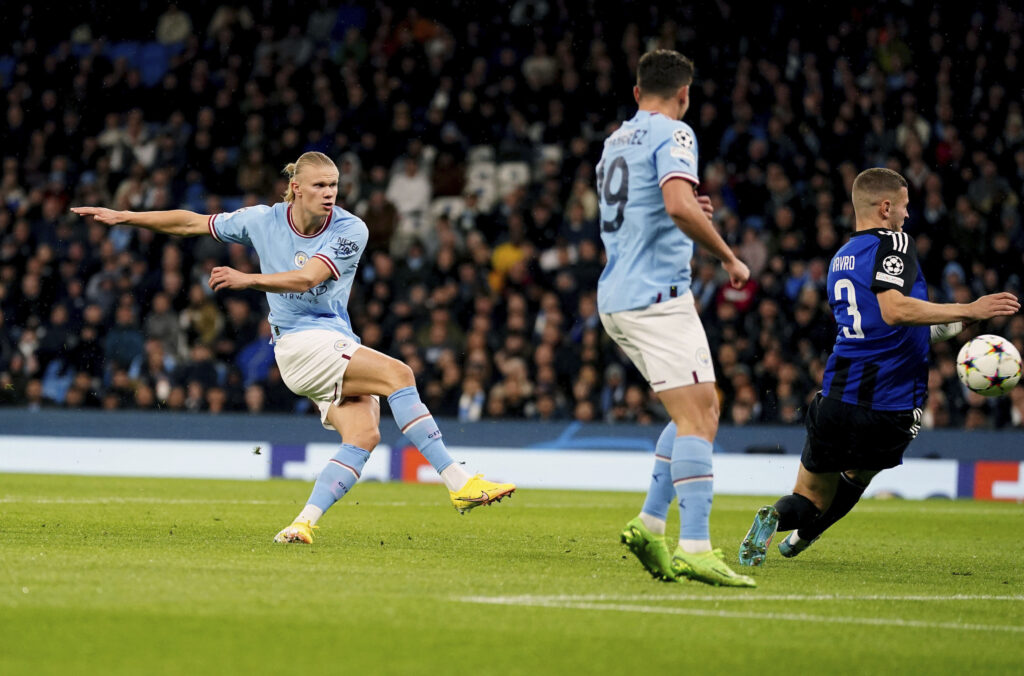
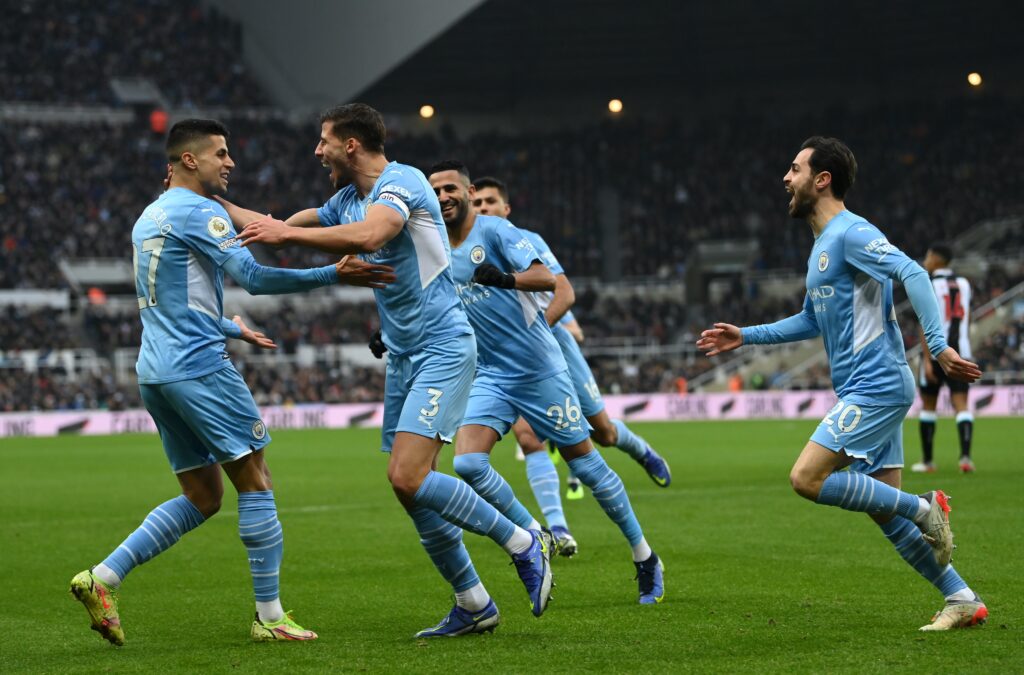
History

City gained their first honours by winning the Second Division in 1899; with it came promotion to the highest level in English football, the First Division. They went on to claim their first major honour on 23 April 1904, beating Bolton Wanderers 1–0 at Crystal Palace to win the FA Cup; the Blues narrowly missed out on a League and Cup double that season after finishing runners-up in the league campaign, but they still became the first club in Manchester to win a major honour.[15] In the seasons following the FA Cup triumph, the club was dogged by allegations of financial irregularities, culminating in the suspension of seventeen players in 1906, including captain Billy Meredith, who subsequently moved across town to Manchester United.[16] A fire at Hyde Road destroyed the main stand in 1920, and in 1923 the club moved to their new purpose-built stadium at Maine Road in Moss Side.[17]

In the 1930s, Manchester City reached two consecutive FA Cup finals, losing to Everton in 1933, before claiming the Cup by beating Portsmouth in 1934.[18] During the 1934 run, the club broke the record for the highest home attendance of any club in English football history, as 84,569 fans packed Maine Road for a sixth-round FA Cup tie against Stoke City – a record which stood until 2016.[19][20] The club won the First Division title for the first time in 1937, but were relegated the following season, despite scoring more goals than any other team in the division.[21] Twenty years later, a City team inspired by a tactical system known as the Revie Plan reached consecutive FA Cup finals again, in 1955 and 1956; just as in the 1930s, they lost the first one, to Newcastle United, and won the second. The 1956 final, in which the Blues defeated Birmingham City 3–1, saw City goalkeeper Bert Trautmann continuing to play on after unknowingly breaking his neck.[22]
After being relegated to the Second Division in 1963, the future looked bleak with a record low home attendance of 8,015 against Swindon Town in January 1965.[23] In the summer of 1965, the management team of Joe Mercer and Malcolm Allison was appointed. In the first season under Mercer, Manchester City won the Second Division title and made important signings in Mike Summerbee and Colin Bell.[24] Two seasons later, in 1967–68, City claimed the league championship for the second time, beating their close neighbours Manchester United to the title on the final day of the season with a 4–3 victory at Newcastle United.[25] Further trophies followed: City won the FA Cup in 1969 and a year later triumphed in the European Cup Winners’ Cup, defeating Górnik Zabrze 2–1 in the 1970 final. This was the club’s only European honour until their triumph in the 2022–23 UEFA Champions League.[26] The Blues also won the League Cup that year, becoming the second English team to win a European trophy and a domestic trophy in the same season.
The club continued to challenge for honours throughout the 1970s, finishing one point behind the league champions on two occasions and reaching the final of the 1974 League Cup.[27] One of the matches from this period that is most fondly remembered by supporters of Manchester City is the final match of the 1973–74 season against arch-rivals Manchester United, who needed to win to have any hope of avoiding relegation. Former United player Denis Law scored with a backheel to give City a 1–0 win at Old Trafford and confirm the relegation of their rivals.[28][29] The final trophy of the club’s most successful period of the 20th century was won in 1976, when Newcastle United were beaten 2–1 in the League Cup final.

A long period of decline followed the success of the 1960s and 1970s. Malcolm Allison rejoined the club to become manager for the second time in 1979, but squandered large sums of money on several unsuccessful signings, such as Steve Daley.[30] A succession of managers then followed – seven in the 1980s alone. Under John Bond, City reached the 1981 FA Cup final but lost in a replay to Tottenham Hotspur. The club were twice relegated from the top flight in the 1980s (in 1983 and 1987), but returned to the top flight again in 1989 and finished fifth in 1991 and 1992 under the management of Peter Reid.[31] However, this was only a temporary respite, and following Reid’s departure Manchester City’s fortunes continued to fade. City were co-founders of the Premier League upon its creation in 1992, but after finishing ninth in its first season they endured three years of struggle before being relegated in 1996. After two seasons in the First Division,[b] City fell to the lowest point in their history, becoming the second ever European trophy winners to be relegated to their country’s third-tier league after 1. FC Magdeburg of Germany.
After relegation, the club underwent off-the-field upheaval, with new chairman David Bernstein introducing greater fiscal discipline.[32] Under manager Joe Royle, City were promoted at the first attempt, achieved in dramatic fashion in the Second Division play-off final against Gillingham.[33] A second successive promotion saw City return to the top division, but this proved to have been a step too far for the recovering club, and in 2001 City were relegated once more. Kevin Keegan replaced Royle as manager in the close season, and achieved an immediate return to the top division as the club won the 2001–02 First Division championship, breaking club records for the number of points gained and goals scored in a single season in the process.[34] The 2002–03 season was the last at Maine Road and included a 3–1 derby victory over rivals Manchester United, ending a 13-year run without a derby win.[35] Additionally, City qualified for European competition for the first time in 25 years via UEFA fair play ranking. In the close 2003–04 season, the club moved to the new City of Manchester Stadium. The first four seasons at the stadium all resulted in mid-table finishes. Former England manager Sven-Göran Eriksson became the club’s first foreign manager when appointed in 2007.[36] After a bright start, performances faded in the second half of the season, and Eriksson was sacked on 2 June 2008;[37] he was replaced by Mark Hughes two days later.[38]
By 2008, Manchester City were in a financially precarious position. Thaksin Shinawatra had taken control of the club the year before, but his political travails saw his assets frozen.[39] Then, in August 2008, City were purchased by the Abu Dhabi United Group. The takeover was immediately followed by a flurry of bids for high-profile players; the club broke the British transfer record by signing Brazilian international Robinho from Real Madrid for £32.5 million.[40] There was not a huge improvement in performance compared to the previous season despite the influx of money however, with the team finishing tenth, although they did well to reach the quarter-finals of the UEFA Cup. During the summer of 2009, the club took transfer spending to an unprecedented level, with an outlay of over £100 million on players Gareth Barry, Roque Santa Cruz, Kolo Touré, Emmanuel Adebayor, Carlos Tevez, and Joleon Lescott.[41] In December 2009, Mark Hughes – who had been hired shortly before the change in ownership but was originally retained by the new board – was replaced as manager by Roberto Mancini.[42] City finished the season in fifth position in the Premier League, narrowly missing out on a place in the Champions League but qualifying for the UEFA Europa League.[43]
Continued investment in players followed in successive seasons, and results began to match the upturn in player quality. City reached the FA Cup final in 2011, their first major final in over 30 years, after defeating derby rivals Manchester United in the semi-finals,[44] the first time they had knocked their rival out of a cup competition since 1975. The Blues defeated Stoke City 1–0 in the final, securing their fifth FA Cup and the club’s first major trophy since winning the 1976 League Cup. In the same week, the club qualified for the UEFA Champions League for the first time since 1968 with a 1–0 win over Tottenham Hotspur in the penultimate Premier League match.[45] On the last day of the 2010–11 season, City beat out Arsenal for the third place, thereby securing qualification directly into the Champions League group stage.[46]

Strong performances continued to follow in the 2011–12 season, with the club beginning the campaign in commanding form, including a 5–1 victory over Tottenham at White Hart Lane and a 6–1 humbling of Manchester United at Old Trafford. Although the strong form waned halfway through the season, and City at one point fell eight points behind United with only six games left to play, a slump by United allowed the blue side of Manchester to draw back level with two games to go, setting up a thrilling finale to the season with both teams going into the last day equal on points (City led by eight goals on goal difference). Despite the Blues only needing a home win against Queens Park Rangers, a team in the relegation zone, they fell 1–2 behind by the end of normal time, leading some of United’s players to finish their game, a 1–0 win at Sunderland, celebrating in the belief that they had won the league. However, two goals in injury time – the second by Sergio Agüero in the fourth added minute – resulted in an almost-literal last-minute 3–2 title victory, City’s first in 44 years, with which they became only the fifth team to win the Premier League since its creation in 1992. In its aftermath, the event was described by media sources from the UK and around the world as the greatest moment in Premier League history.[47][48] The game was also notable for former City player Joey Barton’s sending off, where he committed three separate red card-able incidents on three players in the space of only a couple of seconds, resulting in a 12-match ban.[49]
The following season, City failed to capitalise on the gains made in the first two full campaigns of Mancini’s reign. While the Blues rarely seemed likely to drop below second in the table, they posed little title challenge throughout the season. In the Champions League, the club was eliminated at the group stage for the second successive season (this time finishing fourth and losing out on Europa League football as well), while a second FA Cup final in three seasons ended in a 1–0 defeat to relegated Wigan Athletic.[50] Mancini was dismissed two days later, ostensibly as he had failed to reach his targets for the season,[51] but BBC Sports Editor David Bond reported he had been sacked for his poor communication and relationships with players and executives.[52] The Chilean Manuel Pellegrini was named City’s new manager afterwards.[53]

In Pellegrini’s first season, City won the League Cup and regained the Premier League title on the last matchday of the season.[54][55] However, the team’s league form was less impressive in the next couple of years: although they finished as runners-up in 2014–15, the 2015–16 campaign saw City end up fourth on goal difference, their lowest position since 2010. On the other hand, Pellegrini delivered another League Cup win and, more importantly, he guided City to the Champions League semi-finals, which they narrowly lost to future champions Real Madrid. This was the club’s highest-ever finish in the Champions League, but Pellegrini’s reign was nonetheless ended in anticipation of City’s dream manager.[56]
Pep Guardiola, former head coach of Barcelona and Bayern Munich, was confirmed to become Manchester City’s new manager on 1 February 2016,[57] months before Pellegrini finished his term, and has remained in charge to this day.[58] In the Guardiola era, City won the 2017–18 Premier League title with the highest points total in history and broke numerous other club and English league records along the way.[59] They also won the League Cup that season, and Sergio Agüero became the club’s all-time leading goalscorer.[60]
The following season, Guardiola guided the club to retain their Premier League and League Cup titles, the first time in history that City had completed any successful title defence. The team then went on to win the FA Cup final and complete an unprecedented domestic treble of English men’s titles.[61]
In 2020, UEFA banned Manchester City from European competitions for two seasons for alleged breaches of the UEFA Financial Fair Play Regulations; the club appealed to the Court of Arbitration for Sport, who overturned the ban within months, finding that some allegations were above the five-years-old limit for such UEFA investigations, while the other allegations were unproven. The CAS also reduced UEFA’s fine from €30 to €10 million.[62][63]
In April 2021, it was announced that City had joined the proposed European Super League as one of its twelve founder members together with the five other “Big Six” English football clubs.[64] However, the announcement led to widespread condemnation from The Football Association, the Premier League, UEFA, and FIFA, as well as from the UK’s Conservative government and Prime Minister Boris Johnson.[65][66][67] Within 48 hours of the initial announcement on 20 April, City confirmed that they had withdrawn from the Super League to be followed shortly by the other five English clubs. By the following day, only three of the original founders – Barcelona, Real Madrid and Juventus – remained committed, and it seemed that the proposal had collapsed.[68]

In the COVID-19 affected 2020–21 Premier League season, Manchester City regained their title from Liverpool, becoming champions for the third time in four years.[69] They ended the season twelve points ahead of second-placed Manchester United, winning the title with three games to spare.[70] They also won the League Cup for a record-equalling fourth consecutive and eighth time in total, beating Tottenham 1–0 in the final.[71] City’s league victory was the tenth league and cup title of Guardiola’s five-year tenure, making him the most successful manager in the club’s history.[72] The season was highlighted by City’s European breakthrough, with the club reaching their first-ever Champions League final,[73] where they met Chelsea, making it the third all-English final in the competition history. However, the Sky Blues were defeated 1–0 at the Estádio do Dragão in Porto, courtesy of a Kai Havertz goal. Still, City’s breakthrough marked their most successful European campaign until they reached the Champions League final again in 2023.[74]
A report from German outlet Der Spiegel in April 2022 claimed, based on leaked internal documents, that the Abu Dhabi owners had previously made payments into the club disguised as sponsorship contributions by Emirati companies Etihad and Etisalat (the same claim that the club had successfully defended against at the CAS in 2020), Sheikh Mansour’s Abu Dhabi United Group (ADUG) had allegedly indirectly paid for underage players to sign with the club, and that Manchester City had allegedly used a fictitious contract between Roberto Mancini and Mansour’s Al Jazira Club to pay large compensation fees to the former manager in addition to his salary. It also claimed that these three cases were under investigation by the Premier League for the last three years.[75][76] In response, Manchester City dismissed these claims as untrue and classified them as another attempt to undermine the reputation and integrity of the club.
City produced another campaign to remember in 2021–22, retaining their league title, following another close title race with Liverpool and making it four titles in five seasons. In another case of “typical City”, needing four points from their last two fixtures, the Blues had fallen behind by two goals in both games, only to recover to a 2–2 draw at West Ham, and to a 3–2 home win against Aston Villa in the season finale. These last three goals were all scored in a five-minute blitz between the 76th and 81st minutes, in moments that would sit alongside the famous victories in the 1999 play-off final against Gillingham and the 2011–12 Premier League finale against QPR.[77] City also reached the Champions League semi-finals again that season (and for only the third time in their history), but were beaten there by Real Madrid 6–5 on aggregate a.e.t. over two closely fought and very dramatic games.[78]

The 2022–23 season turned out to be the greatest in the club’s history, as Manchester City won their third consecutive Premier League title, the FA Cup final against rivals Manchester United, and, most importantly, their maiden Champions League title, thereby assembling a rare feat – the continental treble. The road to the Champions League victory included convincing victories over the perennial favorites and European giants Bayern Munich, who were defeated 4–1 on aggregate, and Real Madrid, who suffered a 1–5 aggregate loss at the hands of City after their controversial 6–5 extra time victory at the same stage a year before.[79][80][81]
League history
|
|
|
|
|
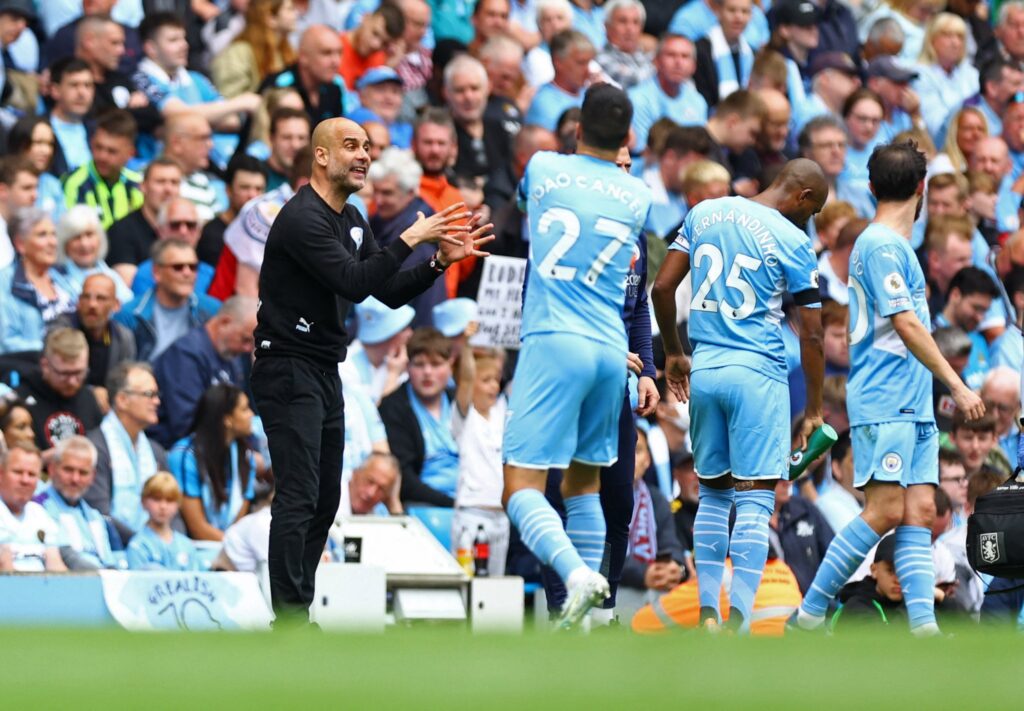
Lorem ipsum dolor sit amet, consectetur adipiscing elit. Ut elit tellus, luctus nec ullamcorper mattis, pulvinar dapibus leo.





